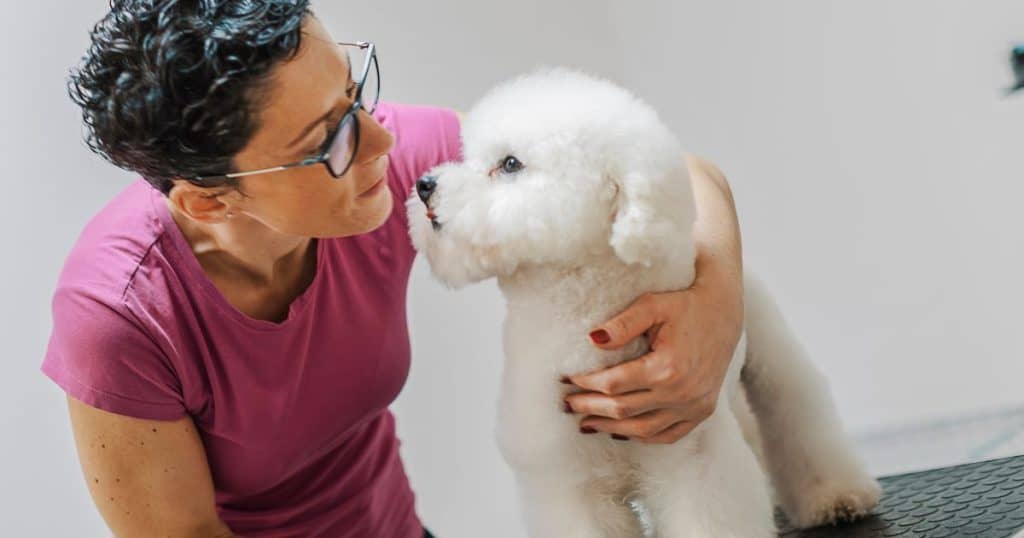What to Know
Bichon Frise is a small breed of dog that is known for its fluffy white coat and playful personality. These dogs are popular pets for families and individuals alike, and many people are interested in learning more about their growth and development. One way to track a Bichon Frise’s growth is by using a growth chart, which can help owners understand what to expect as their puppy grows into an adult dog.
Growth charts for Bichon Frises can provide a lot of useful information for pet owners. For example, they can help you determine if your puppy is growing at a healthy rate and if they are likely to reach their full size within a certain timeframe. Additionally, growth charts can help you estimate how much your Bichon Frise will weigh when they are fully grown, which can be useful for planning their diet and exercise routine.
While growth charts can be a helpful tool for pet owners, it’s important to remember that every dog is unique and may not follow the same growth pattern as others of their breed. Additionally, factors such as diet, exercise, and overall health can all impact a Bichon Frise’s growth and development. Therefore, it’s important to use growth charts as a general guideline rather than a strict rule when it comes to tracking your dog’s growth.
Why Monitor Bichon Frise Growth?

Bichon Frise puppies are small and delicate, and monitoring their growth is crucial to ensure they are developing properly. By tracking their weight and size, you can identify potential health issues early on and take the necessary steps to address them.
It is also important to monitor their growth to ensure they are getting the right nutrition. Bichon Frises have specific dietary requirements, and feeding them the wrong food or overfeeding them can lead to obesity and other health problems. By monitoring their growth, you can adjust their diet accordingly to ensure they are getting the right nutrients in the right amounts.
Another reason to monitor Bichon Frise growth is to ensure they are developing socially and behaviorally. Puppies that are not growing properly may be more prone to behavioral issues, such as anxiety or aggression. By tracking their growth, you can identify any issues early on and take steps to address them, such as socializing them more or working with a trainer.
Overall, monitoring Bichon Frise growth is essential to ensuring they grow up healthy and happy. By tracking their weight and size, you can identify potential health issues, adjust their diet, and address any behavioral issues early on, setting them up for a long and healthy life.
Bichon Frise Growth Chart Basics

Bichon Frise is a small-sized breed with an average weight of 12 to 18 pounds. The Bichon Frise growth chart is an essential tool for pet owners to track the growth and development of their furry friends. Here are some basics about the growth chart that every Bichon Frise owner should know:
How to Use a Bichon Frise Growth Chart
Using a Bichon Frise growth chart is simple. First, you need to know the age and weight of your puppy. Then, find the corresponding age and weight on the chart to determine if your puppy is growing at a healthy rate. It is important to remember that growth rates can vary, and not all Bichon Frises will follow the same growth pattern.
It is recommended to use a growth chart in conjunction with regular visits to the veterinarian to ensure your Bichon Frise is growing and developing properly.
Understanding Growth Chart Percentiles
Growth chart percentiles are used to compare your Bichon Frise’s growth to other Bichon Frises of the same age and sex. For example, if your Bichon Frise is in the 50th percentile for weight, it means that half of the Bichon Frises of the same age and sex weigh more, and half weigh less.
It is important to keep in mind that growth chart percentiles are not a definitive measure of your Bichon Frise’s health. If your Bichon Frise falls below the 10th percentile or above the 90th percentile, it may be a cause for concern, and you should consult with your veterinarian.
What to Do If Your Bichon Frise Is Not Growing Properly
If your Bichon Frise is not growing properly, there could be a variety of reasons why. It is important to consult with your veterinarian to determine the cause and develop a plan of action.
Some common reasons why a Bichon Frise may not be growing properly include poor nutrition, genetic factors, underlying health conditions, or environmental factors. Your veterinarian can help you identify the cause and provide appropriate treatment.
Factors Affecting Bichon Frise Growth

Nutrition
The nutrition that a Bichon Frise puppy receives is a significant factor in their growth. Like all puppies, Bichon Frises need a balanced diet that includes lean protein, fat, carbohydrates, vitamins, and minerals. Proper nutrition is crucial for their growth and development.
It is essential to feed your Bichon Frise puppy the right amount of food. Overfeeding can lead to obesity, which can cause health problems in the future. Underfeeding, on the other hand, can lead to stunted growth and malnourishment.
Exercise
Exercise is another crucial factor that affects the growth of Bichon Frises. Regular exercise helps to build strong muscles, bones, and joints, which are essential for their growth and development.
Bichon Frise puppies should get plenty of exercise, but it is essential to provide them with age-appropriate activities. Too much exercise can put stress on their growing bodies, while too little exercise can lead to a sedentary lifestyle, which can cause health problems.
Genetics
Inherited concerns have a significant impact on the growth of a Bichon Frise. Genetics, in conjunction with other environmental factors, influence their development.
Some Bichon Frises may grow faster or slower than others due to their genetics. It is essential to understand your puppy’s breed and family history to determine their expected growth rate.
Health Conditions
Health conditions can also affect the growth of Bichon Frises. Certain health issues, such as thyroid problems or malabsorption syndromes, can cause stunted growth or weight gain.
If you suspect that your Bichon Frise puppy has an underlying health condition, it is essential to take them to the vet for a checkup. Early detection and treatment can help prevent further complications from developing.
FAQs
When Should You Start Using a Growth Chart for Your Bichon Frise?
It is recommended to start using a growth chart for your Bichon Frise as soon as you bring them home. This will help you track their growth and ensure that they are developing as expected. You can find Bichon Frise growth charts online or from your veterinarian.
How Often Should You Measure Your Bichon Frise?
It is recommended to measure your Bichon Frise every week until they are fully grown. This will help you track their growth and ensure that they are developing as expected. Once your Bichon Frise is fully grown, you can measure them every few months to ensure that they are maintaining a healthy weight.
What Is the Average Weight and Height of a Bichon Frise?
The average weight of a Bichon Frise is between 10 and 16 pounds, and the average height is between 9 and 11 inches. However, it is important to note that every Bichon Frise is unique and may not fit within these averages.
What Are the Common Growth Problems That Bichon Frises Experience?
One common growth problem that Bichon Frises experience is hip dysplasia, which is a condition where the hip joint does not develop correctly. Another common growth problem is patellar luxation, which is a condition where the kneecap dislocates from its normal position. It is important to monitor your Bichon Frise’s growth and speak with your veterinarian if you notice any issues.
How Can You Ensure That Your Bichon Frise Grows Healthily?
There are several things you can do to ensure that your Bichon Frise grows healthily:
Feed them a healthy diet that is appropriate for their age and size
Provide them with regular exercise and playtime
Take them to the veterinarian for regular check-ups and vaccinations
Monitor their growth and speak with your veterinarian if you notice any issues
Provide them with a safe and comfortable living environment
Before You Go
The Bichon Frise Growth Chart is an important tool for dog owners to track their puppy’s growth and development. It provides a general idea of what to expect in terms of weight and size as the puppy grows into adulthood. While every Bichon Frise is unique and may not follow the growth chart exactly, it can be a helpful guide for owners to ensure their dog is growing at a healthy rate.
Owners should keep in mind that genetics, nutrition, exercise, and other factors can influence their Bichon Frise’s growth and development. Regular check-ups with a veterinarian can help ensure that the puppy is on track and healthy.
It’s important for owners to provide their Bichon Frise with a balanced diet and plenty of exercise to support their growth and development. Overfeeding or underfeeding can lead to health problems and affect their growth rate. Owners should also be aware of their Bichon Frise’s activity level and adjust their diet accordingly.
Overall, the Bichon Frise Growth Chart can be a helpful tool for owners to monitor their puppy’s growth and ensure they are on track for a healthy adulthood. By providing proper nutrition, exercise, and regular check-ups with a veterinarian, owners can help their Bichon Frise grow into a happy and healthy companion.
Related Articles:

